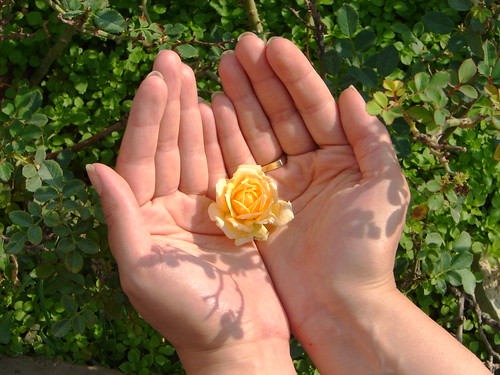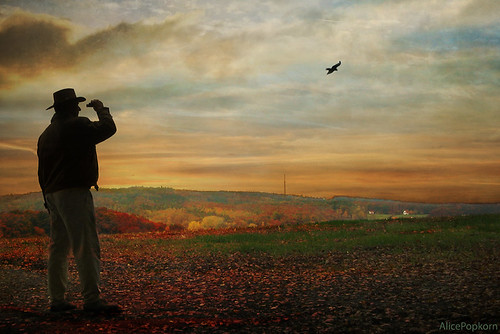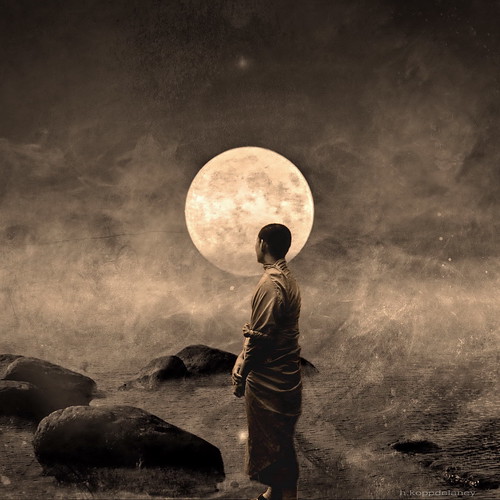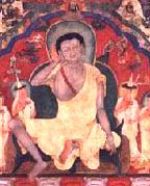What I Have Learned So Far
by Mary Oliver
Meditation is old and honorable, so why should I
not sit, every morning of my life, on the hillside,
looking into the shining world? Because, properly
attended to, delight, as well as havoc, is suggestion.
Can one be passionate about the just, the
ideal, the sublime, and the holy, and yet commit
to no labor in its cause? I don’t think so.
All summations have a beginning, all effect has a
story, all kindness begins with the sown seed.
Thought buds toward radiance. The gospel of
light is the crossroads of — indolence, or action.
Be ignited, or be gone.
 — from New and Selected Poems, by Mary Oliver
— from New and Selected Poems, by Mary Oliver

/ Image by Hamed Saber /
This, to me, is an interesting poem, the way it wrestles with that age-old question of spirituality: faith or works, jnana or karma… indolence or action.
Does the seeking of wisdom lead one into such an internalized state that one abandons the world to its confusion and suffering? Even when we awaken profound compassion within ourselves, is compassion enough without action to back it up? Ultimately the question boils down to, is enlightenment a good in and of itself, or does it only fulfill itself through service?
Different traditions and teachers give us different answers. Many teachers will say that trying to “do good” without first achieving some measure of inner clarity cannot achieve its full potential. Some even say that spiritual opening has a natural resonance; the enlightened are like radio transmitters, apparently doing little, apparently silent, they broadcasting powerful waves into the world. They argue that there can be action that is good intentioned, but meaningless or unstable. And there can be apparent inaction that shakes the universe.
Others say that spirituality and compassion without heartful action is anemic at best, that the physical and social world are themselves part of our spiritual landscape, that we must embody our spirituality on that level too. This criticism can go so far as to say that spirituality in a cave is easy, spirituality in the world is hard; that’s where we truly prove our awakening love. They argue that action always exists, even the avoidance of action is action. One must always seek to express the inner state with outer action. And for the spiritually minded, that action must be in the form of compassionate service to a struggling world.
Mary Oliver seems to, gently, favor the latter philosophy:
Can one be passionate about the just, the
ideal, the sublime, and the holy, and yet commit
to no labor in its cause? I don’t think so.
Me? I have a fiery nature, and I like a statement like Mary Oliver’s. I see too much passivity in good-hearted people, myself included sometimes.
But I don’t ultimately see a great conflict with any of these philosophies. The universe is a big universe, with endless pathways for the human spirit to travel. The more we release our enlightened selves, the more we naturally embody who we naturally are.
For some, that resolves itself into a profound stillness that is outer as well as inner. And do they not ring out from their mountaintops and closets? Do we not, on some level, hear them and ring out a little more ourselves?
For others, stillness and love seeks a pathway of expression through action and service. The way they use the same two hands we all possess — doesn’t it make our own fingers a little itchy for their own movement?
=
Sending out a special note of love and blessings to regions so affected by floods recently — Texas, and Northern India and Nepal. Sadly, these extreme weather patterns are becoming the new normal. Both as individuals and as a society in general, we need to adjust our thinking and preparations to expect more of these sorts of events. The most important lesson is that we come together, that we help when we can, and that we minimize suffering and destruction as much as possible through forethought and necessary changes in entrenched ways of doing things.
Recommended Books: Mary Oliver
Continue Reading »
 — from Fakhruddin Iraqi: Divine Flashes (Classics of Western Spirituality) , Translated by William Chittick / Translated by Nasr Seyyed Hossein
— from Fakhruddin Iraqi: Divine Flashes (Classics of Western Spirituality) , Translated by William Chittick / Translated by Nasr Seyyed Hossein










